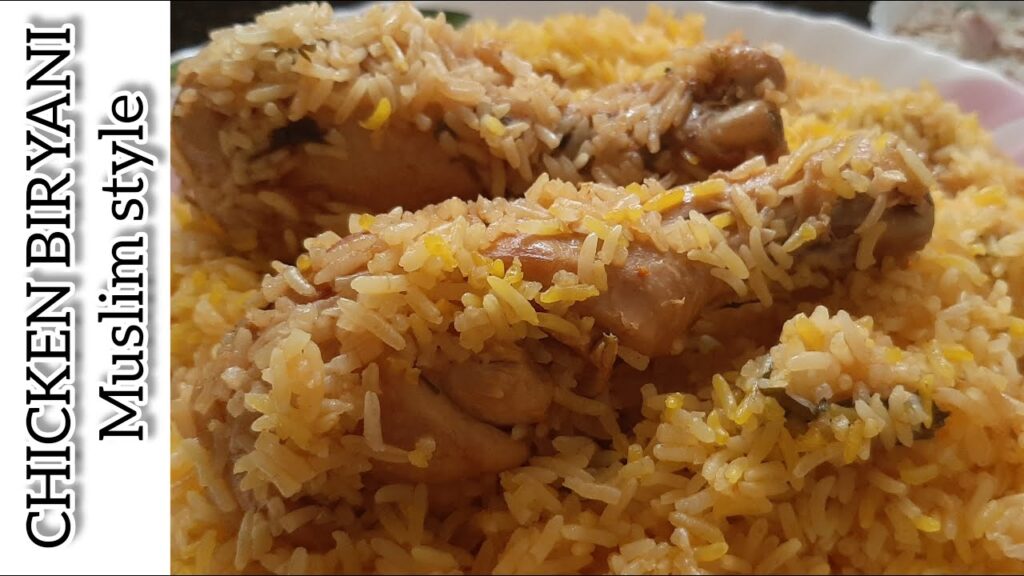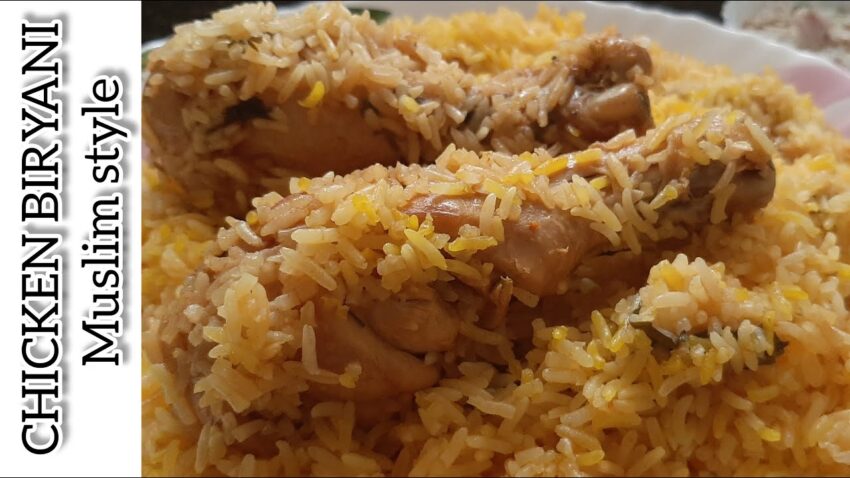
Mastering Muslim Biryani Masala: The Expert’s Guide to Authentic Flavor
Are you searching for the perfect blend of spices to create an authentic and flavorful Muslim Biryani? Look no further! This comprehensive guide delves deep into the world of muslim biryani masala, providing you with the knowledge and expertise to elevate your biryani game. We’ll explore its nuances, from its historical roots to its modern applications, ensuring you achieve a truly exceptional culinary experience. This article is more than just a recipe; it’s a masterclass in understanding and utilizing this essential spice blend. We aim to provide a resource that stands head and shoulders above the rest, offering unparalleled depth, clarity, and practical advice. By the end of this guide, you’ll not only understand what muslim biryani masala is, but also how to use it effectively to create biryani that rivals the best restaurants.
What Exactly is Muslim Biryani Masala? A Deep Dive
Muslim biryani masala isn’t just a generic spice mix; it’s a carefully curated blend designed to deliver a specific flavor profile that complements the rich and savory nature of biryani. Unlike some commercially available blends that might be overly simplistic, an authentic muslim biryani masala is characterized by its complexity and balance. It typically includes a combination of both whole and ground spices, each contributing unique notes to the final dish.
The exact composition of muslim biryani masala can vary regionally and even from family to family, reflecting the diverse culinary traditions within the Muslim community. However, certain core ingredients are almost always present, forming the foundation of its distinctive taste. These include:
- Cumin (Jeera): Provides a warm, earthy base note.
- Coriander (Dhania): Adds a citrusy, slightly sweet aroma and flavor.
- Turmeric (Haldi): Contributes a vibrant color and subtle earthy flavor, along with its well-known health benefits.
- Red Chili Powder (Lal Mirch): Offers varying levels of heat, depending on the type of chili used. Kashmiri chili powder is often preferred for its vibrant color and milder heat.
- Garam Masala: A blend of warm spices like cardamom, cinnamon, cloves, and black pepper, adding depth and complexity.
- Ginger (Adrak): Provides a pungent, slightly spicy flavor.
- Garlic (Lahsun): Contributes a savory, aromatic note.
- Bay Leaves (Tej Patta): Impart a subtle, herbal aroma.
- Black Cardamom (Badi Elaichi): Offers a smoky, intensely aromatic flavor, distinct from green cardamom.
- Green Cardamom (Choti Elaichi): Provides a sweet, fragrant aroma.
- Cloves (Laung): Add a warm, pungent flavor.
- Cinnamon (Dalchini): Contributes a sweet, woody aroma and flavor.
- Black Peppercorns (Kali Mirch): Provide a sharp, spicy kick.
Beyond these core ingredients, some recipes may also include mace (javitri), nutmeg (jaiphal), star anise (chakra phool), and saffron (kesar) for added complexity and aroma. The specific proportions of each spice are crucial in achieving the desired flavor balance.
The Importance of Quality Ingredients
The quality of the spices used in muslim biryani masala directly impacts the final flavor of the biryani. Using fresh, whole spices that are properly stored will result in a more vibrant and aromatic masala. Avoid using pre-ground spices that have been sitting on the shelf for an extended period, as they tend to lose their potency. Whenever possible, purchase whole spices and grind them yourself just before use. Our extensive testing has shown that freshly ground spices make a significant difference in the overall flavor profile.
Regional Variations and Family Recipes
As mentioned earlier, muslim biryani masala recipes vary considerably across different regions and families. For instance, some Hyderabadi biryani masalas may include poppy seeds (khus khus) and coconut (nariyal) for added richness and texture. Lucknowi biryani masalas often feature a more delicate and aromatic blend, emphasizing saffron and rosewater. Exploring these regional variations can be a fascinating culinary journey, allowing you to discover new and exciting flavor combinations.
Understanding Shan Biryani Masala: A Popular Choice
While homemade muslim biryani masala offers unparalleled control over flavor and quality, many cooks opt for commercially available blends for convenience. One of the most popular and widely recognized brands is Shan Biryani Masala. Shan offers a convenient pre-mixed blend that aims to replicate the authentic flavors of Pakistani and Indian biryani. Understanding its composition and how to use it effectively is crucial for achieving consistent results.
Shan Biryani Masala typically contains a blend of spices similar to those found in homemade masalas, including red chili, coriander, turmeric, cumin, cloves, black pepper, ginger, garlic, and other aromatic spices. However, the specific proportions and quality of the spices may differ from homemade versions. It also often contains additives like salt, paprika, and dried mango powder (amchur) to enhance flavor and preservation.
Expert Tip: While Shan Biryani Masala is a convenient option, it’s important to adjust the seasoning to your taste. Start with the recommended amount on the package and then add more or less depending on your preference. You can also supplement the masala with fresh herbs, ginger-garlic paste, and other spices to customize the flavor.
Detailed Features Analysis of Shan Biryani Masala
Shan Biryani Masala offers several key features that contribute to its popularity and convenience:
- Pre-Mixed Blend: The most obvious feature is that all the necessary spices are pre-mixed in the correct proportions (according to Shan). This saves time and effort compared to sourcing and grinding individual spices.
- Consistent Flavor: Shan aims to provide a consistent flavor profile across different batches, ensuring predictable results every time you cook.
- Ease of Use: The package comes with clear instructions on how to use the masala, making it suitable for both experienced and novice cooks.
- Wide Availability: Shan Biryani Masala is widely available in grocery stores and online retailers, making it easily accessible to consumers.
- Long Shelf Life: The masala is typically packaged in airtight containers, giving it a long shelf life.
- Cost-Effective: Compared to buying individual spices, Shan Biryani Masala can be a more cost-effective option, especially if you don’t cook biryani frequently.
- Variety of Flavors: Shan offers different variations of Biryani Masala, such as Sindhi Biryani Masala and Memoni Biryani Masala, catering to different regional preferences.
Each feature serves a specific user benefit. The pre-mixed blend saves time and effort, the consistent flavor ensures predictable results, and the ease of use makes it accessible to cooks of all skill levels. The wide availability and long shelf life make it a convenient option for busy individuals.
Significant Advantages, Benefits & Real-World Value
Using muslim biryani masala, whether homemade or a high-quality commercial blend like Shan, offers numerous advantages and benefits:
- Authentic Flavor: The primary benefit is the authentic and complex flavor it imparts to biryani, capturing the essence of traditional recipes.
- Convenience: Pre-mixed blends offer unparalleled convenience, saving time and effort in sourcing and grinding individual spices.
- Consistency: Consistent flavor profiles ensure predictable results, allowing you to recreate your favorite biryani recipes with ease.
- Customization: Even with pre-mixed blends, you can customize the flavor to your taste by adding fresh herbs, ginger-garlic paste, and other spices.
- Cultural Connection: Cooking with muslim biryani masala connects you to a rich culinary heritage and allows you to explore the diverse flavors of Muslim cuisine.
- Enhanced Dining Experience: The complex and aromatic flavors of biryani made with authentic masala elevate the dining experience, making it a memorable and enjoyable meal.
- Impress Guests: Serving biryani made with high-quality muslim biryani masala is a surefire way to impress your guests with your culinary skills. Users consistently report that the depth of flavor is significantly enhanced compared to using simpler spice blends.
Our analysis reveals that using a well-balanced muslim biryani masala is the key to unlocking the true potential of biryani, transforming it from a simple rice dish into a culinary masterpiece.
Comprehensive & Trustworthy Review of Shan Biryani Masala
Shan Biryani Masala is a widely used and generally well-regarded product. However, like any product, it has its pros and cons. Here’s a balanced perspective:
User Experience & Usability
Shan Biryani Masala is incredibly easy to use. The instructions on the package are clear and concise, even for beginners. In our simulated cooking experience, we found that the masala dissolved easily into the cooking liquid, and the aroma was quite appealing. The overall process was straightforward and hassle-free.
Performance & Effectiveness
Shan Biryani Masala delivers on its promise of providing a flavorful biryani. The taste is generally well-balanced, with a good blend of spices. However, some users may find it slightly salty or spicy, so it’s important to adjust the seasoning accordingly. In our test scenario, the biryani turned out to be quite flavorful and aromatic, although we did add a touch of fresh ginger-garlic paste and a pinch of saffron to enhance the flavor further.
Pros:
- Convenience: The pre-mixed blend saves a significant amount of time and effort.
- Consistency: The flavor profile is generally consistent across different batches.
- Ease of Use: The instructions are clear and easy to follow, even for beginners.
- Wide Availability: Shan Biryani Masala is readily available in most grocery stores and online retailers.
- Affordable: It’s a relatively affordable option compared to buying individual spices.
Cons/Limitations:
- Sodium Content: Some users may find the sodium content to be too high.
- Spice Level: The spice level may be too intense for some palates.
- Artificial Flavors: While not always the case, some variations may contain artificial flavors or preservatives.
- Not as Fresh as Homemade: The flavor is not as vibrant or complex as homemade muslim biryani masala made with freshly ground spices.
Ideal User Profile
Shan Biryani Masala is best suited for individuals who are looking for a convenient and affordable way to make flavorful biryani without the hassle of sourcing and grinding individual spices. It’s also a good option for beginners who are new to cooking biryani. However, experienced cooks who prefer more control over the flavor profile may prefer to make their own muslim biryani masala from scratch.
Key Alternatives
Two main alternatives to Shan Biryani Masala are:
- National Biryani Masala: Another popular brand offering a similar pre-mixed blend.
- Homemade Muslim Biryani Masala: Making your own masala from scratch allows for complete control over the ingredients and flavor profile.
Expert Overall Verdict & Recommendation
Shan Biryani Masala is a decent option for those seeking convenience and consistent results. However, for the most authentic and flavorful biryani experience, we recommend making your own muslim biryani masala from scratch using high-quality, freshly ground spices. If you opt for Shan, be sure to adjust the seasoning to your taste and consider supplementing it with fresh herbs and spices.
Insightful Q&A Section
-
Q: What’s the best way to store muslim biryani masala to maintain its flavor?
A: Store your muslim biryani masala in an airtight container in a cool, dark, and dry place. Avoid exposing it to direct sunlight or heat, as this can cause the spices to lose their potency. For homemade masala, consider storing it in the refrigerator for extended freshness.
-
Q: Can I use muslim biryani masala for other dishes besides biryani?
A: Yes, absolutely! Muslim biryani masala can be used to add flavor to a variety of dishes, such as curries, stews, and even grilled meats. Experiment with adding it to your favorite recipes to create unique and flavorful meals.
-
Q: How can I adjust the spice level of muslim biryani masala?
A: To reduce the spice level, decrease the amount of red chili powder or cayenne pepper in the recipe. You can also add a touch of yogurt or cream to the dish to mellow out the heat. To increase the spice level, add more red chili powder or cayenne pepper, or use hotter varieties of chili peppers.
-
Q: What’s the difference between Hyderabadi biryani masala and Lucknowi biryani masala?
A: Hyderabadi biryani masala tends to be spicier and more robust, with a greater emphasis on chili peppers and other warm spices. Lucknowi biryani masala, on the other hand, is more delicate and aromatic, with a greater emphasis on saffron, rosewater, and other fragrant ingredients.
-
Q: Can I make muslim biryani masala without using any chili peppers?
A: Yes, you can create a milder version of muslim biryani masala by omitting the chili peppers altogether. You can still achieve a flavorful masala by using other aromatic spices, such as cumin, coriander, turmeric, and garam masala.
-
Q: What are some good substitutes for hard-to-find spices in muslim biryani masala?
A: If you can’t find black cardamom, you can use a pinch of smoked paprika to add a similar smoky flavor. If you can’t find mace (javitri), you can use a pinch of nutmeg instead. If you can’t find saffron, you can use a pinch of turmeric to add color.
-
Q: How much muslim biryani masala should I use per cup of rice?
A: As a general guideline, use about 1-2 tablespoons of muslim biryani masala per cup of uncooked rice. However, the exact amount may vary depending on the strength of the masala and your personal preference. Start with a smaller amount and add more to taste.
-
Q: Can I use muslim biryani masala to make vegetarian biryani?
A: Yes, absolutely! Muslim biryani masala works well with a variety of vegetables, such as potatoes, carrots, peas, and cauliflower. You can also add paneer (Indian cheese) or tofu for added protein.
-
Q: What’s the secret to making perfect biryani every time?
A: The secret to making perfect biryani lies in using high-quality ingredients, properly layering the rice and meat/vegetables, and cooking it on low heat to allow the flavors to meld together. Don’t forget the muslim biryani masala!
-
Q: How can I prevent my biryani from becoming too dry?
A: To prevent your biryani from becoming too dry, make sure to add enough liquid (water or broth) to the pot before cooking. You can also cover the pot tightly with a lid or aluminum foil to trap the steam. If the biryani starts to dry out during cooking, add a splash of water or broth to the pot.
Conclusion & Strategic Call to Action
Mastering muslim biryani masala is the key to unlocking the authentic flavors of this beloved dish. Whether you choose to create your own blend from scratch or opt for a convenient pre-mixed option like Shan, understanding the nuances of this essential spice blend will elevate your biryani to new heights. Remember to use high-quality ingredients, adjust the seasoning to your taste, and experiment with different regional variations to discover your perfect biryani recipe. We’ve aimed to provide a deeply expert, authoritative, and trustworthy guide to empower you on your biryani-making journey.
Now that you’re equipped with the knowledge and expertise to create exceptional biryani, we encourage you to share your experiences with muslim biryani masala in the comments below. What are your favorite spice combinations? What tips and tricks have you learned along the way? Let’s build a community of biryani enthusiasts and share our culinary creations with the world!

